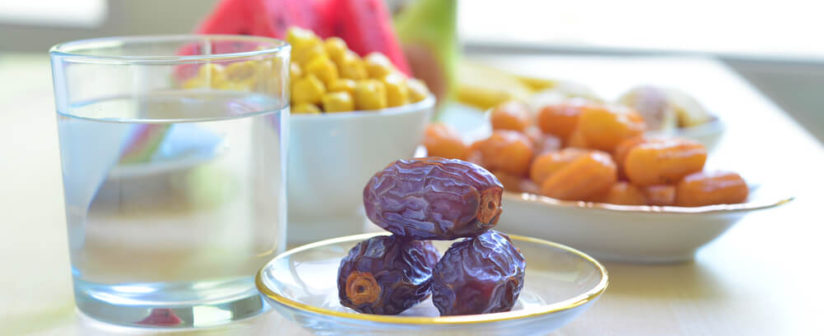The month of Ramadan is a great opportunity to focus on bringing back a balanced and healthy lifestyle in your life.Through fasting you begin to learn how to manage your eating habits, how to improve self-control and discipline.This month requires you to give the stomach a break, and by doing so you are able to break down and expel the accumulated toxins from your body.
The month of Ramadan is here and so are the scorching sun and the hot summers in most parts of the world. Fasting requires a lot of energy and commitment on part of each individual, especially when Ramadan is being accompanied by a recurring heat wave. To not fall sick due to dehydration and the demands of this month, there are certain tips and tricks that one should definitely keep in mind.
Never skip ‘Suhour’
Just as breakfast is the most important meal of the day, ‘Suhour’ (the meal eaten before dawn) is equally important during Ramadan. The pre-dawn meal helps your body stay hydrated and fuelled up on energy and nutrients until your next meal at iftar. It also helps you avoid overeating when you break your fast at sunset.
A well-balanced meal at ‘suhour’ contains:
- Complex carbohydrates: Oats, wheat, lentils, grains and other complex carbohydrates (like fava beans) are slow-releasing carbs, helping keep your blood sugar steady and giving you a feeling of fullness for the greater part of the day.
- High-fibre foods: Fibre-rich foods are digested slowly and include cereals, dates, figs, bran, whole wheat, grains, seeds, potatoes, vegetables and almost all fruit especially apricots and prunes. Bananas are a good source of potassium and other essential nutrients that help keep your body hydrated.
- Protein-rich foods: High protein foods like eggs, cheese, yoghurt or meat are also recommended as they can help replenish your energy throughout the day.
IFTAR TO REPLENISH YOUR ENERGY STORES – WHAT TO EAT TO COMPENSATE FOR LIQUIDS AND NUTRIENTS?
- Start your meal with dates
Dates are a very important source of sugar that will replenish the energy you lost throughout the long hours of fasting, it is rich in fibers that will regulate your bowel movements. They are rich in magnesium and potassium as well.
- Stay hydrated
This year Ramadan will be at the peak of summer when temperatures are hitting as high as 45 degrees. You have to make sure that you drink enough water after you break your fast so that you do not feel thirsty or have any signs of dehydration the following day. Drink 8 glass of water throughout the night.
- Avoid thirst
- Make sure you drink plenty of fluids and water between Iftar and Suhour to prevent dehydration
- Limit your intake of fried foods and foods high in fats and sugar
- Avoid foods high in salt such as pickles, salty crackers and nuts, and canned foods
- Try not to drink too much tea especially at Suhour as it can increase fluids lost through urination
- Don’t overeat at the Suhour meal
- Break your fast slowly
Start with dates, water, followed by soup, a bowl of salad and then go to the main meal. If you feel full after the salad, you can take a break and continue your meals later. Overeating can cause stomach pain and bloating which is a very common problem that people face during Ramadan. Starting your iftar meal with a warm soup comforts the stomach after a long day of fasting, replenishes your body with fluids and help prepare the digestive system for this meal.
- Ensure that your meal has all food groups
Your iftar should have a source of grains, proteins, vegetables, fruits and healthy oils.
- Make healthy food choices
Choose whole grains, lean meat, chicken breast, fish, olive oil in moderation and whole fruits instead of fruit juices. Stay away from fried food, and food high in fat.
Meats, legumes, eggs and dairy products are rich in proteins. Ensure you have at least one of these sources in every Ramadan meal since proteins are very important for your body cells. They also increase your satiety level thus reducing the temptation for eating sweets.
- Avoid Salty and Sugary Foods
Eating sweets immediately after iftar will result to bloating and cause a delay in digestion. It will also cause a fluctuation in the blood glucose level, which will lead to you craving for more sweets. That’s why, it is recommended to have sweets in moderation 2-3 hours after iftar.
Delightful sweets in Ramadan are hard to resist. To avoid consuming too many calories, indulge and enjoy with your family the tasty and creative delights while making sure you always practice portion control and moderation.
The more the food is salty, spicy and processed the more it will make you thirsty the following day. The body breaks sugary foods faster, and this will also make you hungry sooner.
- Avoid coffee
If you are a coffee drinker, try and reduce your coffee consumption two weeks prior to Ramadan in order to avoid headaches and sleepiness.
- Divide your meals
Having three meals is still important during this holy month: iftar, a light evening snack, and suhoor. This would help you avoid continuous snacking throughout the non-fasting hours.
Divide your main course into three parts. Have one quarter of the plate filled with complex carbohydrates, one quarter with lean meat or meat alternatives, and half with vegetables. This will ensure that you have a healthy balanced meal.
- Exercise
Adding exercise to your daily routine during Ramadan is very beneficial. This will help you maintain a healthy weight and healthy lifestyle.
If you are a regular athlete used to moderate or vigorous exercise, you can still maintain this by incorporating your exercise session just before iftar. Make sure to hydrate immediately after your session and eat slowly to replenish your fluid and nutrients. Try exercising an hour or two after you break your fast.


